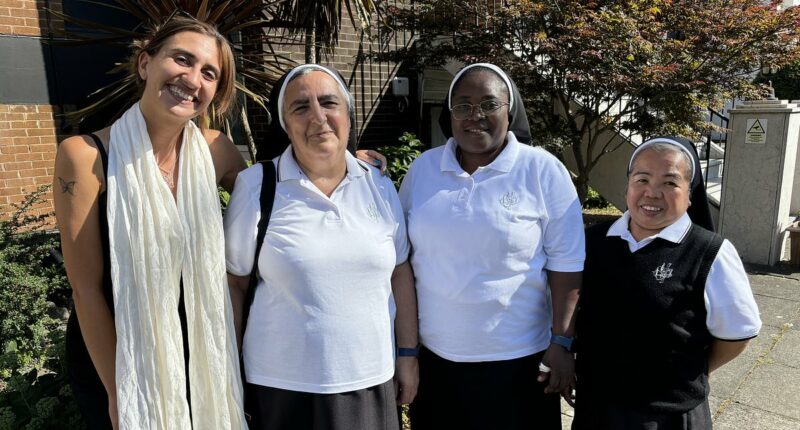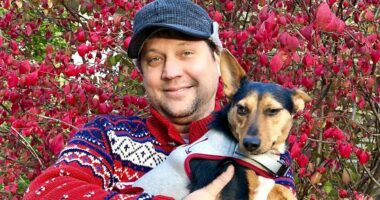Share this @internewscast.com
I vividly recall the day my father entered our home, clad entirely in black. Black shirt, black trousers, black shoes. He resembled a priest.
I was 16. He stood in the doorway, gave this half-smile and said he’d finally found his calling. ‘God,’ he said.
I chuckled. I couldn’t hold it back. You see, anyone familiar with him would understand my reaction. He was always pursuing something – a new goal, a fresh idea, a different job – and this seemed just like his latest whim.
My mother, on the other hand, showed no reaction. She merely glanced his way and then returned her attention to the stack of unpaid bills on the kitchen table. At that point, she was juggling two jobs, just managing to keep us afloat, with their divorce already in progress.
Following that day, there wasn’t a proper farewell. He simply vanished, stopped responding to messages, and ignored my calls. As the months passed, it became clear that this wasn’t another of his eccentric ideas. He wasn’t coming back.
In our small Bulgarian village, where rumors circulated at lightning speed, I started hearing harsh comments that seemed unfitting for someone supposedly dedicated to the church. He’d been spreading tales to others that I was ‘too costly’, always seeking money, a burden.
It’s a hard thing to fathom – your father adopting a holy guise and informing the neighbors his own daughter wasn’t worth the expense of education, the English classes I longed for to study abroad, or even a dress for my graduation.
Despite his lack of help, I moved abroad to Scotland. I earned two master’s degrees. I survived losing my mum to a brain aneurysm. I fell, I broke, I rebuilt. I found a career I’m proud of. I became the strong woman I know my mother always hoped I’d be.
And yet, even though more than a decade has passed, I still couldn’t understand what kind of life was worth leaving your child behind for. So perhaps it was inevitable that my intrigue led me to the doors of St Monica House in Clapham, run by Augustinian sisters.
After reading online about the convent, I asked if they would be open to me joining their order for a few days, if it would help me, even for a moment, understand the pull of the religious life.

Stella meets with Sister Marisa, 63, Sister Margaret, 45, and Sister Kath, 56

Stella’s father, Venelin, before he left her to follow his ‘calling’ as a priest

‘When I was 16, he just disappeared – stopped replying to texts, ignored my calls’

Stella standing in front of St Monica House in Clapham, a guest house and convent run by the Augustinian nuns

Stella, 7, and her mother Galina at Galina’s second job as a barista; her main job was teaching
That’s how I found myself in the company of three Augustinian sisters who, despite being from different corners of the world, had all made the same decision: to serve God ‘completely and freely’.
They hadn’t been forced into religious life. They weren’t running from anything. They chose this life – with full awareness, and a quiet kind of conviction I’d rarely seen in the outside world.
Their day starts at 6.45am sharp – with prayers, meditation, and Mass. Then everyone gets on with their duties, whether that’s cleaning the chapel or cooking – humdrum tasks, done in silence. They come together again at 12.30pm for lunch, and then at 6.15pm for evening prayers.
And I did it all. I followed the same routine, step by step. By the time I left, I’d probably prayed more in a few days than I had in my entire life up to that point.
The sisters describe themselves as ‘one family, one community, bound by God and by rules’. There are no personal bank accounts – just one shared convent account.
‘What I have belongs to everyone,’ one of them told me. ‘We possess nothing.’ Their calling is about giving, not taking. About leaving everything behind to serve something greater.
And I found myself wondering – is this what a real calling looks like? Not an escape or a rejection of responsibility, but something generous.

The sisters’ day starts at 6.45am sharp – with prayers, meditation, and Mass

Guests are invited to join the sisters for daily Mass in the private chapel, Monday to Saturday

The sisters describe themselves as ‘one family, one community, bound by God and by rules’

The nuns even took Stella to St George’s Cathedral to celebrate The Sacred Heart of Jesus

Their calling is about ‘leaving everything behind to serve something greater’
Sister Marisa is in her sixties now. Originally from Malta, she’s lived in several countries, speaks multiple languages, and has a dry sense of humour that makes you feel like you’re in on something.
Her story started with a motorcycle accident. She was 15, and while recovering, she picked up a book about God.
Something shifted and at 17, she entered novitiate. Eight years later, she took her vows.
‘I remember my old life, but I don’t miss it. I had a relationship with this boy, I used to go out and everything, I was very active,’ she said. ‘But this life now I chose freely, and I still choose every single day.’
Despite the strength of her conviction, she does not gloss over how tough the path she’s chosen can be.
‘It’s not always easy. I’ve left countries, languages, people I loved,’ she explained. ‘I left my family behind. My father died before my mother. And if I didn’t believe in eternal life, that loss would have broken me.’
And still, she insists it was worth it.
‘We give things up, yes. But what we receive is bigger. Peace. Serenity. God’s love. And the joy of working with others,’ she told me, smiling. ‘It’s something I offered voluntarily for a greater life.
‘Young people today, they’re searching for something that can truly fulfil their lives.
‘Continue searching until you find the Person – with a capital P – who really gives you life and love. Then you can truly live your life.’
She paused, before noting: ‘No, I’m not just talking about a religious vocation. Even if they live their lives loving God, that’s enough.’
God is not her only devotion in life though. When it comes to football, Sister Marisa is just as passionate as the rest of us.
‘I support England. Manchester United might’ve been an option once,’ she said with a grin. ‘But apparently, they’re not doing too well this season.’

They took the vows of ‘chastity, obedience, and poverty’

Their breakfast and dinner are more modest, with larger portions served at lunch

Most rooms are single or twin bedrooms, some with shared bathroom facilities

There is a shared lounge where guests can relax, read, or socialise quietly, as well as a separate room designated for Bible study (pictured above)
Unlike Sister Marisa, who has been a nun for most of her life, Sister Margaret, now 45, started spiritual formation as a novice in 2021 after Covid, but the calling wasn’t sudden.
‘I didn’t just wake up one morning and decide to become a nun,’ she told me. ‘It’s always been in me.’
It made me think back to my father. To me, it definitely looked like he had just woken up one day and thought, ‘I’m going to be a priest’, especially considering we only ever went to church at Christmas and Easter.
As a child, Sister Margaret watched the sisters in her parish care for children at a school for the blind with a kind of passionate joy that stayed with her.
‘When I was 10, I saw how they loved their work, how they gave themselves fully, and I knew I wanted that too.’
But when she turned 18 and told her family she wanted to follow this path, her brother pushed back.
‘He wanted me to study medicine instead of going to the convent,’ she recalled.
She obeyed, but even while studying, she ‘kept attending church to keep herself on track.’
Marriage proposals came her way, and she admitted: ‘There was one I seriously considered, but before saying yes, I needed to be certain. I prayed, asking God to guide me and show me the right path.’
On the seventh day, the sisters called her asking if she would want to join a convent in Rome.
‘That was the answer I needed. I felt peace, clear and strong. This was my path.’
She spoke of the vows she took – chastity, obedience, and poverty – not as restrictions, but as pathways to true freedom.
And with a quiet smile, she summed it up: ‘You give everything, and you receive everything. We live peacefully, as a family. God brought us together.’

Stella’s stepdad Dobri visits her for the first time in London
I only stayed in the convent for a few days, but thinking back to everything the sisters told me, there was something pure about their conviction. Their ability to live in the moment – not dragging their past like a chain or chasing some impossible future impressed me deeply.
Their calling didn’t come at the expense of someone else. It came from peace. It reminded me of my mother.
She never spoke of sacrifice, but she lived it: working long hours, never complaining, always making sure I had what I needed. She found love again with a good man – my stepdad – the only steady father figure I ever really had.
When she passed away four years ago, it was the lowest point of my life. For the first time, I truly thought: ‘That’s it’. By this time, I had moved to the UK to study, and I strongly considered dropping out of my master’s and going back home.
Living abroad as a foreigner wasn’t always easy, but I loved it. Both my mum and I had sacrificed so much for me to be there, and I was just months away from finishing university. I wasn’t ready to give in, but I wasn’t sure I had a choice.
That’s when my stepdad stepped in. He supported me emotionally and financially, and we found ourselves connected in a way neither of us could have expected.
He can’t have children. I no longer have parents. Somehow, it feels as if the universe – or perhaps something greater – has placed us in each other’s lives for a reason.
With his support, I completed my master’s and finished first in my class.
You’d think that my mother’s death would be the moment my actual father – the holy man, the priest who still lives in the same village – might step forward.
There was only silence.
It makes you wonder, who’s truly holy – the man with no blood ties who never lets you down, or the one who’d pass his own daughter in the street and pretend she doesn’t exist?
Living among the nuns didn’t help me forgive him.
I did ask them what they thought of the situation and their advice was clear – don’t judge and forgive because you don’t know what he was going through.
It stopped me from trying to understand a choice that was never mine to make. He didn’t leave to serve God – he left to serve himself. But the trauma, the anxiety, the gnawing fear of abandonment? That I can never forgive.
So no, I didn’t find religion in the convent. I found something better: clarity.
And maybe, for now, that’s enough.

















